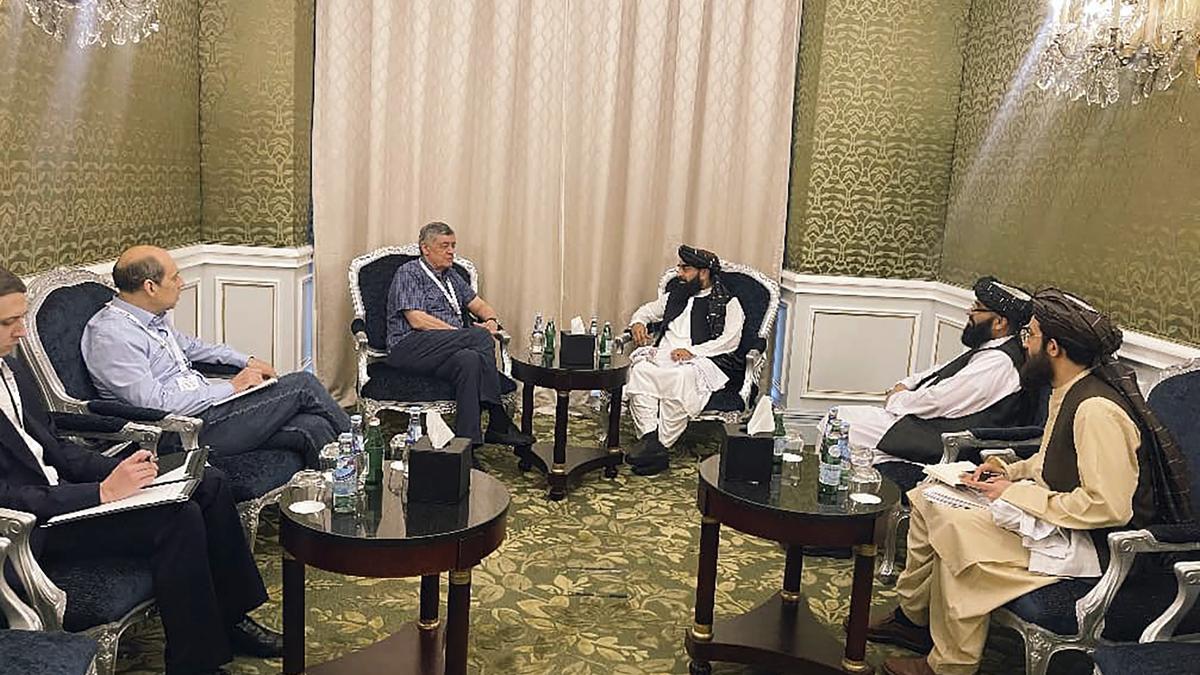Three years into its rule of Afghanistan, the Taliban government has achieved some diplomatic wins even as it has consolidated power and enforced its strict version of Islamic law.
The Taliban rulers continue to operate without official recognition from any country — its restrictions on women a major sticking point.
But concern over Afghanistan’s worsening humanitarian crisis, the threat of terrorism, and hard-nosed pragmatism have led to some international engagement.
The most notable example was the Taliban government’s participation, for the first time, in United Nations-hosted talks in June in Qatar to discuss economic issues and counter-narcotics efforts.
Chief Taliban government spokesman Zabihullah Mujahid, who led the delegation, said the gathering was further proof that: “Afghanistan has come out of isolation”.
“We are in favour of positive meetings with the condition that Afghanistan’s situation is taken into account,” he said in a recent interview ahead of this week’s three-year anniversary of the Taliban taking back power.
The talks went ahead after Kabul obtained the agreement of the UN — which has described restrictions on women in Afghanistan as “gender apartheid” — that civil society and women’s rights groups would not attend.
Obaidullah Baheer, grandson of former warlord Gulbuddin Hekmatyar and an Afghan academic, said engagement at the talks was a “smart approach”.
“The international community can’t solve the women’s rights issue. What they can do is try to create an environment” to gradually stabilise the economy in Afghanistan, Baheer said.
“Economic stability naturally brings with it some sort of opening for politics as well.”
Security the ‘priority’
The Taliban authorities, who are still pushing to fill Afghanistan’s seat at the UN, are also forging regional ties.
“Currently we have very good relations with neighbouring, regional and Muslim countries,” Mujahid said, adding that about 40 countries had embassies or consulates in Afghanistan.
While Western embassies in Kabul have been closed for three years, Pakistan, China, Russia, Iran and Central Asian republics have established de facto diplomatic relations with Kabul.
Russia is also preparing to remove the Taliban from its list of terrorist organisations, while Beijing has appointed its first ambassador to Kabul since the takeover.
Fears over the growing security threat from the Islamic State group’s branch in the region, known as Islamic State Khorasan Province, have also spurred engagement.
Last week, the UN warned that IS-K posed the greatest external terrorist threat to Europe and was growing in strength.
Mujahid insisted the IS threat was being overblown.
“We have brought the phenomenon of ISKP to nearly zero,” he said.
After ousting the foreign-backed government and ending their 20-year insurgency, the Taliban rulers have made security one of their highest priorities.
‘Dialogue’
The Taliban authorities still allocate a large part of the national budget to security despite Afghanistan no longer being at war and its economy in dire straits.
And while Afghans may welcome restored security after more than 40 years of successive conflicts, many also struggle to feed themselves and strain under tightening restrictions.
A civil society activist, who asked to remain anonymous for fear of reprisal, described the rules on daily life as becoming “stricter and stricter”.
Government affairs are mostly run through religious edicts from the reclusive supreme leader Hibatullah Akhundzada, based in the Taliban southern stronghold of Kandahar.
Politically, there is no visible opposition: parties are banned and there are no elections.
“There is no one to challenge the Emir,” the civil society activist said.
The UN has described a “climate of fear” in the country, where popular protests are virtually non-existent.
The Taliban government rejects these accusations.
“We don’t accept that we are totalitarian,” Mujahid said.
The authorities have “mechanisms… to convey the voice of the people to the government”, spokesman Mujahid said, referring to provincial counsels comprising clerics and tribal elders.
“They might not be the same as in the previous government or what are common in democratic governments, but we have developed these mechanisms in an Islamic way and we are committed to the country’s interests,” Mujahid said.
Baheer, based in Kabul, said he still believed dialogue could bring about change.
“What we can do is constantly speak to the nation and these people (the Taliban authorities), creating a larger national pressure and ultimately… hoping that they realise that they are up against the people and they have to compromise,” said the academic.



